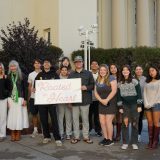So you’re in an MFA program–now what? A guest post by MFA Candidate Candice Yacono
March 21, 2019
From Mid-Career to MFA (Part 1)
By Candice Yacono
For anyone mid-career who is planning to embark on an MFA in Creative Writing, questions of fitting in might be raised. Will I belong at Chapman University? Will fellow students be able to relate to my life experiences? Will the next two to three years involve almost-mandatory partying after every class? Will the university’s librarians or cashiers believe I’m a student when I show them my student ID?
According to a 2015 survey by the Association of Writers & Writing Programs (AWP), the median age of MFA students nationwide was 27.3. While the Chapman MFA doesn’t offer an accelerated undergraduate-graduate degree program, some MA in English students are as young as 21 or 22 because they come directly from Chapman’s BA in a 4+1 program. Other MFA students here, however, are in their fifties or sixties. (In 2016, a 92-year-old Arizona woman graduated from Wiilkes University with an MA in creative nonfiction.) No matter one’s age, everyone who enrolls in Chapman University’s MFA in Creative Writing program is brought together by our love of language and eagerness to learn from the faculty and from each other.
A hallmark of a good MFA program like ours is that it welcomes student diversity in all forms, including age. I hadn’t been a full-time student for years, but non-traditional students with promise can find a good home in the MFA program. I share the same drive, creativity, and even imposter syndrome as my peers.
That said, because of my stage of life and career, time management is a key concern for me (as it is for anyone who sticks with their career while pursuing a graduate degree). However, Chapman recognizes this, so most of their graduate classes are offered in the late afternoon or evening. That’s not only convenient for those of us with day jobs or childcare responsibilities, but also a clear message that people with lives like mine belong here. Some MFA students slow their progress to the degree because of full-time work, and that’s okay too—a student can take up to seven years to complete the degree, though most of us finish in the standard two years (or three for the Dual MA/MFA).
Outside of class, it is critical for me to carve out specific times in which I focus on reading, writing essays, completing workshop pages, and doing myriad other tasks. I’ve put some hobbies on hold, but the trade-off is worth it for me.
“Since I was employed full-time, every hour of every day mattered,” MFA alumni Ruben Guzman told me. “So I found that using a spreadsheet to plan my reading and writing time made all the difference.” Once Guzman received his syllabi at the beginning of each semester, he used the spreadsheet to plot out his reading assignments, when he wrote drafts of assignments, etc. “I don’t know how I would have managed without it,” he said.
Any student can keep track of assignments and sign up for notifications of approaching due dates on a smartphone using an app like myHomework or the device’s built-in calendar. These tracking tools may be especially helpful to those of us juggling major life roles in addition to being a full-time student.
Another mid-career MFA student, Destiny Irons, is a freelancer and ghost writer for Fortune 500 executive autobiographies. She relies on external deadlines to get her work done. “Without deadlines, I would be a horrible procrastinator,” she said. A task calendar could be key to this approach to time management.
Doing one’s reading and writing at Chapman’s Leatherby Libraries is a great way to step out of other roles for a few hours and avoid the distractions of routine concerns at home or at the office. The library allows graduate students longer reservation times for study rooms, and we can even check out laptops for free at Argyros Forum to use during class or to write or study elsewhere on campus.
One of the distinctive things about Chapman’s MFA in Creative Writing is that not all of us majored in English as undergraduates. That means that someone who (like me) has been out of college for a while doesn’t have to feel like the only fish out of water in a literature or theory class.
I’m used to spending long hours at my desk. I may not have the academic head start that others do, since I haven’t studied Shakespeare or Derrida for several years, but I do have a head start on the work ethic and perseverance that are necessary to succeed in an MFA program.

